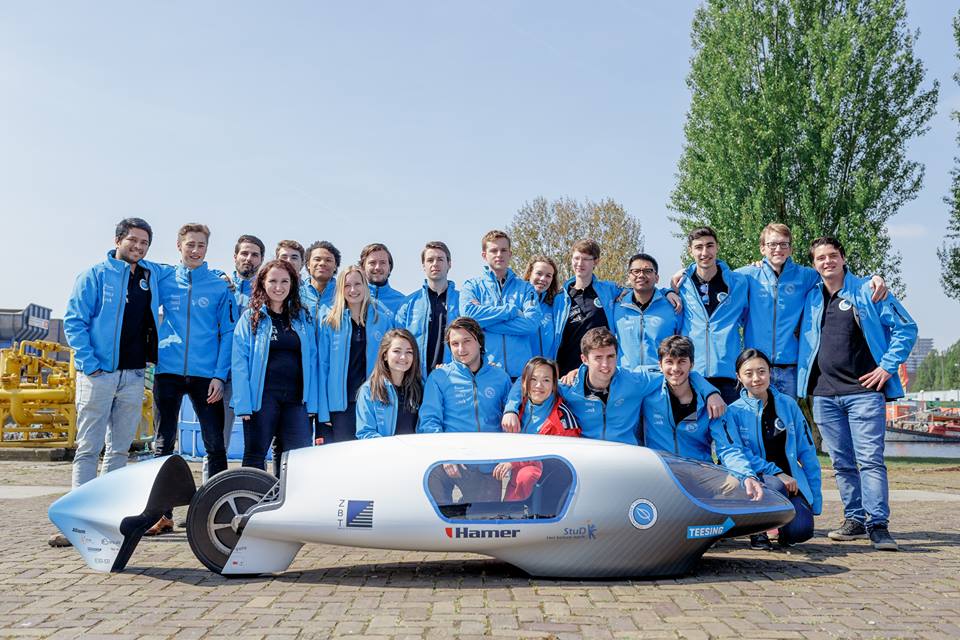
Aerospace Engineering student Paul Hulsman (23) is the Team Manager of the Eco-Runner Team Delft, one of the many DreamTeams at TU Delft. The team’s aim: to build the most fuel-efficient car possible. A new team is now being put together, and Paul reflects on his time with the Eco-Runner. ‘Not everyone at TU Delft realises it, but the D:DREAM Hall is a truly wonderful place’.
The Eco-Runner Team Delft dates back to 2005. The first Eco-Runner Team was founded by three students from the Faculty of Aerospace Engineering. Since then, a new team has been put together every year, which then spends the following months continuing work on the Eco-Runner in the D:DREAM Hall (Delft: Dream Realization of Extremely Advanced Machines). The Delft team subsequently takes the improved Eco-Runner to compete in the Shell, a student competition held in June every year.
Studying and a DreamTeam
Paul Hulsman is Team Manager of the Eco-Runner Team Delft. He is studying the Wind Physics track of the European Wind Energy Master’s (EWEM) at the Faculty of Aerospace Engineering. Paul has already completed the first year of his Master’s. He then decided to take a year out to concentrate on the Eco-Runner (VII) and in September, he departs for Denmark to continue with the second part of his Master’s. Paul: ‘I was previously also involved in another DreamTeam: the Formula Student Team Delft. That was part-time, but I enjoyed it so much that I wanted to join another DreamTeam on a full-time basis. The aim of the Eco-Runner (building the most fuel-efficient car possible) really appealed to me, so that is the team that I applied to join’.
Unique opportunity
‘I think you learn a lot in a DreamTeam that you are unlikely to learn elsewhere’, says Paul. ‘At the Faculty of Aerospace Engineering, we have the Design/Synthesis Exercise at the end of our third year, during which you also learn certain soft skills such as teamwork. But working together with students from other faculties is a different kettle of fish. Also because you realise that everyone tackles certain things slightly differently. During my studies, I had absolutely nothing to do with PR – now I am learning a lot about the field. Alongside learning to take a problem-solving approach to technical issues, you also have to learn how best to communicate with companies. And once I get a job after graduating, I cannot imagine my boss saying: “go and build a car”. This is a unique opportunity’.
Challenges
While every Eco-Runner Team continues to build on the design and expertise gained by the previous team, each new team is faced by fresh challenges; especially when a new Eco-Runner is built, as was the case this year. Paul: ‘One of our greatest technical challenges was to tailor the design of the Eco-Runner VII to a more dynamic track with tighter corners than on previous tracks. That makes fuel-efficient driving more difficult. The drivetrain had to be completely redesigned, which meant that the suspension also needed to be adjusted. So while you are always taking the Eco-Runner to the next step, some things just have to be developed from scratch’.
The trial
The Shell Eco-marathon was held in London in late May of this year. Each team is given four attempts as standard, and each attempt consists of ten laps. During the first attempt, the Eco-Runner VII suffered a puncture. During the second attempt, the top cover flew off due to strong winds. A screw came loose during the third attempt and in the fourth, the fuel cell began to leak. Unfortunately, the team were therefore unable to complete any of their attempts. Paul: ‘Luck was certainly not on our side this year. Nevertheless, it was fantastic to experience the atmosphere and meet the other teams. And I am hugely proud of our team’. The current record stands at 3,771 km, which is roughly the distance from Amsterdam to Rome and back.
For the next generation
Paul: ‘You can work on the Eco-Runner either part-time or full-time, but I would recommend full-time. In retrospect, I think that it is better to take a year out between the Bachelor’s and Master’s, instead of during the Master’s. Personally, I missed a degree of work experience during the first year of the Master’s. But that is perhaps because EWEM is home to lots of students who already have some work experience. In Denmark, for example, it is quite common to work for three or four years after completing your Bachelor’s before starting your Master’s, but that seems a bit inconvenient to me. A year out is perfect. You learn so much in such a short space of time, and it is an unforgettable experience. How many people can say that they have designed and built their own car?’
---.
Want to learn more about the Eco-Runner? Follow the Facebook page or visit the website.
Interested in joining the team? Click here to apply.